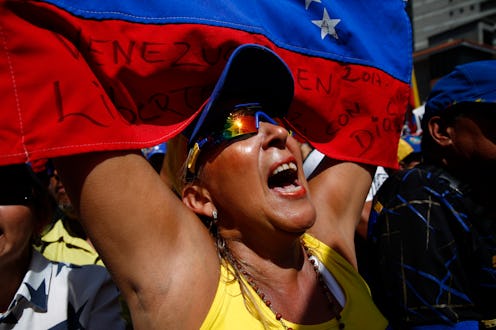
Recently, the international community has become increasingly involved in the political unrest in Venezuela, as the country faces a leadership crisis. As news about this unrest continues to emerge, you might be wondering why exactly Venezuela is protesting — and whether Trump's administration has become involved in the crisis. In fact, Trump has taken an assertive stance on the country's political crisis, and even delivered a speech on Monday in Miami to address the issue.
Venezuela's political unrest came to a head on Jan. 23, 2019, as the BBC reported. On this date, Juan Guaidó, the leader of Venezuela's legislature, declared himself the interim president of the country. The outlet stated that Guaidó's declaration came two weeks after President Nicolás Maduro had been sworn in to office for a second six-year term following his reelection in May 2018.
Notably, this election was quite controversial. The BBC reported that Venezuela's main opposition party had boycotted the election because some of its candidates had been prohibited from running, had been jailed, or had fled the country. This election controversy, coupled with Maduro's widely-lambasted leadership that some say helped push the country into economic catastrophe, contributed to Guaidó's decision to declare himself president, Al Jazeera reported.
Indeed, Venezuela has experienced an ongoing and devastating socioeconomic crisis since Maduro's first term. From 2014 onward the country has endured significant hyperinflation, which has rapidly driven up the prices of goods, as well as a shortage of food, medicine, and other necessities. Vice noted that this crisis has caused over 3 million Venezuelans to leave the country.
Moreover, as CNN reported, opposition parties in Venezuela have also repeatedly accused Maduro of creating a dictatorship. According to the outlet, Maduro's administration has frequently blocked referendums seeking to remove him from power. Moreover, the country's Supreme Court, which is controlled by Maduro's United Socialist Party, also dissolved Venezuela's parliament in March 2017. While this decision was reversed in August 2017, it sparked massive outcry in the country.
All of these actions sparked protests in 2017 and again following Maduro's reelection in January 2019. That month, thousands of Venezuelans took to the streets to protest against Maduro, as The Guardian reported. Notably, some smaller pro-Maduro protests also took place. More recently, on Feb. 12, protesters demanded that Venezuela allow humanitarian aid supplies sent from the United States into the country, as they are currently being blocked from entry by Maduro's administration, per Vice.
Trump's administration has taken a clear stance on Venezuela's leadership crisis, as the American president nearly immediately recognized Guaidó as the interim president. Indeed, Trump emailed a statement to reporters on Jan. 23 that read:
Today I am officially recognizing the President of the Venezuelan National Assembly, Juan Guaido, as the Interim President of Venezuela ... We continue to hold the illegitimate Maduro regime directly responsible for any threats it may pose to the safety of the Venezuelan people.
In his statement, Trump emphasized that he believes that recognizing Guaidó as president represents respecting the freedom of the Venezuelan people to choose a leader without interference. Moreover, during his speech in Florida on Monday, Trump referred to Maduro as a "Cuban puppet" and also characterized the crisis in Venezuela as one that highlights the perils of socialism, CNN reported.
Overall, Venezuelans are protesting because of the current political crisis sparked by years of socioeconomic turmoil. Trump's administration has clearly defined where it stands regarding the country's leadership crisis — and now it's hoping others will follow its lead. Indeed, Trump's administration recently called on the European Union to recognize Guaidó's presidency, Reuters reported.